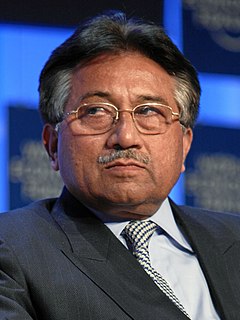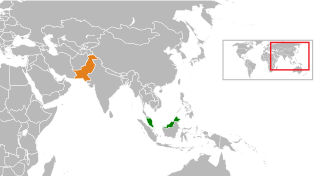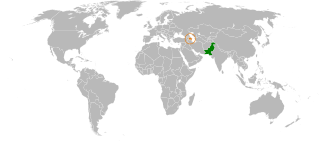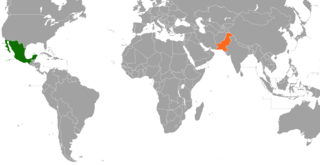
General Pervez MusharrafNI(M) HI(M) TBt is a former Pakistani politician and four-star general of the Pakistan Army who became the tenth president of Pakistan after the successful military takeover of the federal government in 1999. He also served as the 10th Chairman Joint Chiefs of Staff Committee from 1998 to 2001 and the 7th Chief of Army Staff from 1998 to 2007. Musharraf held the presidency from 2001 until 2008, he fled the country and resigned to avoid impeachment. In 2007, he declared emergency and suspended the Constitution of Pakistan for which he was tried for high treason and sentenced to death, but he hasn't returned to the country after resigning.

Nazim Hussain Siddiqui a Pakistani jurist who served as Chief Justice of the Supreme Court of Pakistan, from 31 December 2003 to 29 June 2005.

Pakistan and Bangladesh are both South Asian Muslim-majority countries. Following the end of the British Empire, the two countries formed a single state for 24 years. The Bangladesh Liberation War in 1971 resulted in the secession of East Pakistan as the People's Republic of Bangladesh. Pakistan recognized Bangladesh in 1974 after pressure from across the world.

Pakistan–Turkey relations refers to the bilateral relationship between Pakistan and Turkey. Pakistan has an embassy in Ankara, a Consulate-General in Istanbul and an honorary consulate in İzmir whereas, Turkey has an embassy in Islamabad, a Consulate-General in Karachi and honorary consulates in Lahore, Peshawar, Sialkot and Faisalabad. As of 2016, in a joint communique, Pakistan and Turkiye plan to strengthen their close ties into a strategic partnership.

Cuba–Pakistan relations refers to the bilateral relations between Cuba and Pakistan. Cuba has an embassy in Islamabad and Pakistan has an embassy in Havana. Relations between the countries strengthened after Cuba provided humanitarian assistance to the victims of the 2005 Kashmir earthquake.

Malaysia–Pakistan relations refer to bilateral foreign relations between the two countries, Malaysia and Pakistan. Pakistan has its high commission (embassy) in Kuala Lumpur, and Malaysia has its high commission in Islamabad. Both countries are members of the Commonwealth of Nations and the Organisation of Islamic Cooperation.

Relations between Algeria and Pakistan are excellent. Pakistan was one of the first countries to recognize the Provisional Government of Algerian Republic and its mission was opened in Karachi, the then capital of Pakistan in 1958. Both sides have convergence of views on issues of international importance. Both countries have also been supporting each other in various multilateral forums including UN, OIC and NAM. Algeria has an embassy in Islamabad and Pakistan has an embassy in Algiers.

Extremely strong and cordial relations exist between Bahrain and Pakistan. Bahrain maintains an embassy in Islamabad and a Consulate-General in Karachi, whilst Pakistan maintains an embassy in Manama. Both countries are members of the OIC and of the G 77.

Pakistan-Vietnam relations, or Pakistani-Vietnamese relations, refers to the bilateral relationship between the Socialist Republic of Vietnam and Islamic Republic of Pakistan. The relationship is largely based on mutual trade and international political cooperation between the two countries. Pakistan is represented in Vietnam by its embassy in Hanoi, and Vietnam also maintains an embassy in Islamabad. During the Cold War, Pakistan maintained close ties with the United States-led Western Bloc to counter rival India's allegiance with the Soviet Union and Eastern Bloc. Throughout the 1960s and 1970s, the United States was involved in the Vietnam War against Soviet-backed North Vietnam while in the same time period, Pakistan had engaged in two major wars with neighbouring India in 1965 and 1971, the latter of which resulted in a devastating defeat for Pakistan and saw the emergence of an independent Bangladesh. Due to the fact that Pakistan was an ally with the United States and had begun to indirectly wage war against the Soviets in Afghanistan with heavy U.S.−backing, relations became strained between the two, with Pakistan closing its diplomatic mission in Vietnam in 1980 and Vietnam doing the same in 1984. However, relations greatly improved in the 2000s, and Pakistan reopened its embassy in Hanoi in October 2000. Vietnam also reopened its embassy in Islamabad and trade office in Karachi in December and November 2005, respectively. Relations between the two countries have continued to remain friendly, with Vietnam expressing an interest in increased economic and military cooperation with Pakistan. The heads of both nations have in recent times paid official visits to each other, with Pakistani President Pervez Musharraf visiting Vietnam in May 2001 and Vietnamese President Trần Đức Lương also paying an official visit to Pakistan in March 2004. Throughout the following decade, several visits were made by various Vietnamese and Pakistani ministries to each other. A major part of Pakistan's pursuit to enhance its relationship with Vietnam is outlined in Pakistan's "Vision East Asia" strategy. The emergence of such a strategy came as a result of Pakistan's desire to balance its relations with Vietnam and other East Asian / Southeast Asian states by making an effort to circumvent Pakistan's close relationship with China and Vietnam's growing relationship with India—the former being a cause of concern for Vietnam due to its tense relationship with China and the latter being a cause of concern for Pakistan due to its rivalry and history of armed conflict with India.

Relations between Pakistan and Tunisia are generally cordial. Ties between the two countries are strong and premised upon religious and historical affinity. This is emphasized by the absence of any recurring dispute although there is much potential to augment the level of ties. A number of framework agreements have been concluded between Pakistan and Tunisia in the spheres of trade, tourism, culture, information and industries. However, these have been conspicuous for remaining dormant or being scarcely reviewed at best.

Azerbaijan–Pakistan relations refer to bilaterial relations between the Republic of Azerbaijan and the Islamic Republic of Pakistan. Pakistan has an embassy in Baku and Azerbaijan has an embassy in Islamabad. Both countries are enhancing contact between their respective capitals. The two nations are considered "strategic partners".

Belgium–Pakistan relations are the bilateral relations between Belgium and Pakistan. Belgium has an embassy in Islamabad and Pakistan has an embassy in Brussels.

Nigeria–Pakistan relations refers to the bilateral relations between the nations of Pakistan and Nigeria. Pakistan maintains a High Commission in Abuja, while Nigeria also operates a High Commission in Islamabad as well as a consulate-general in Karachi. The Government of Pakistan plans to open a trade mission agency in Lagos and the Government of Nigeria is also expected to open its trade mission agency in Karachi. The two states have maintained a close relationship, which was described by the Defence Minister of Nigeria as "friendly" and like a "family tie".

Jordan–Pakistan relations are the bilateral relations embedded between the Islamic Republic of Pakistan and the Hashemite Kingdom of Jordan. Pakistan maintains an embassy in Amman whilst Jordan has an embassy in Islamabad.

New Zealand–Pakistan relations refer to the international relations between New Zealand and Pakistan. Pakistan has a High Commission located in Wellington while New Zealand has an honorary consulate in Karachi. New Zealand was party to the Commonwealth Heads of Government decision to readmit Pakistan to the Councils of the Commonwealth after the restoration of civilian rule in May 2008.

Pakistan–Poland relations refers to bilateral relations between Poland and Pakistan, which date back to the 1940s. After the Independence of Pakistan on August 14, 1947, Liaquat Ali Khan, the first Prime minister of Pakistan, made the first diplomatic approaches to the People's Republic of Poland and finally, on December 17, 1962, Pakistan became one of the first Muslim countries to establish relations with then-communist government of Poland.
Filipinos in Pakistan consist of migrants from the Philippines. In 2008, there were an estimated 1,500 Filipinos in Pakistan according to the statistics of the Philippine government. Many Filipinos came to Pakistan for work and those who later married Pakistani men are now holding Pakistani citizenship. Pakistan comparatively has experience good immigration rate from Philippines despite security issues.

Pakistan–Philippines relations refers to bilateral relations between Pakistan and the Philippines.

Myanmar–Pakistan relations refers to the bilateral relationship between the Republic of the Union of Myanmar and the Islamic Republic of Pakistan. Myanmar and Pakistan maintain diplomatic and trade relations.

Mexico–Pakistan relations are the diplomatic relations between Mexico and Pakistan. Both nations are members of the United Nations and the World Trade Organization.























